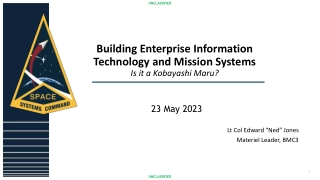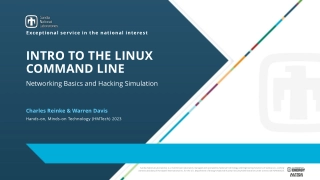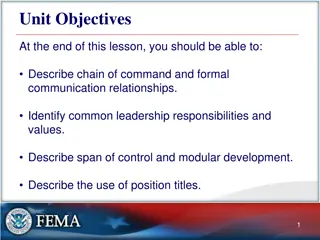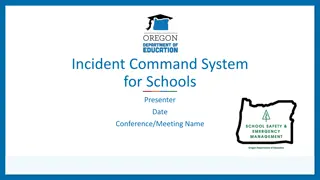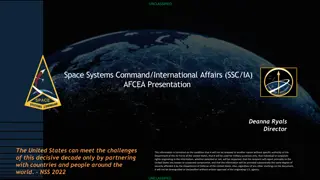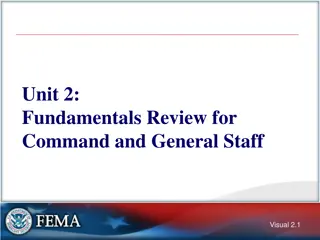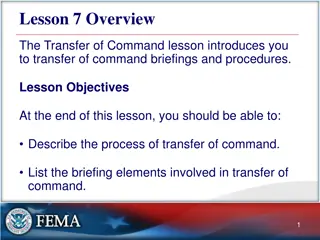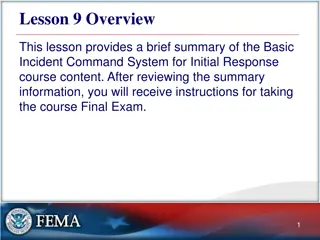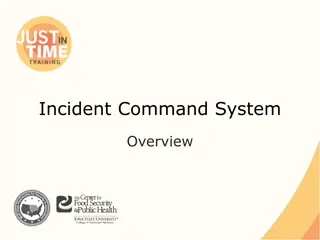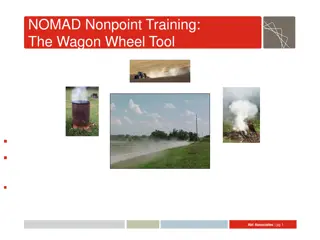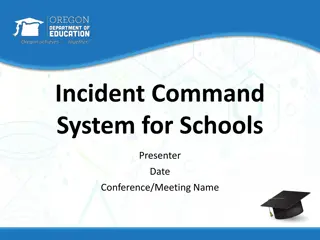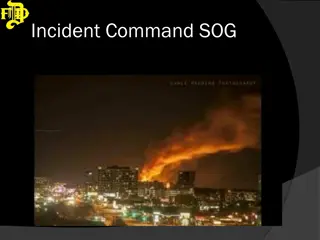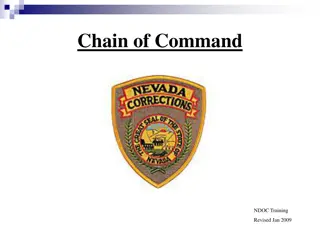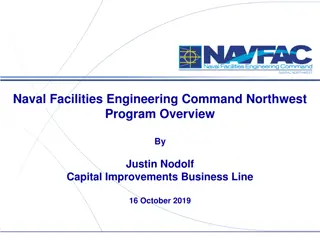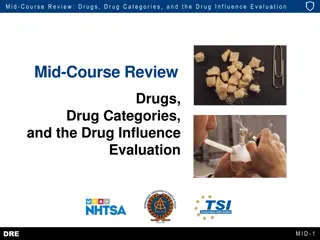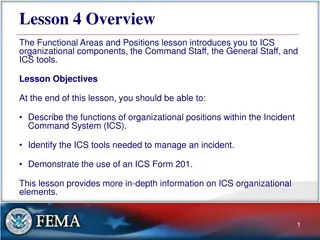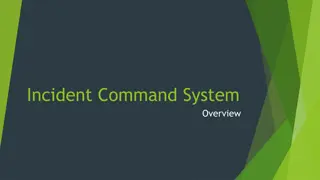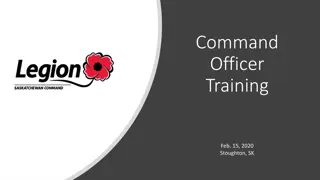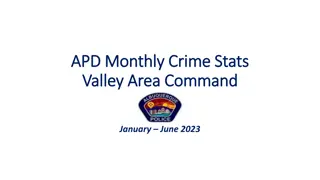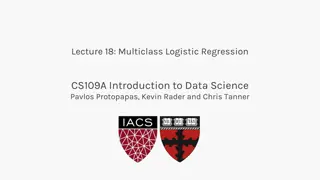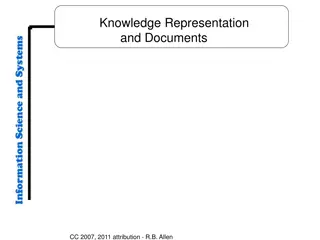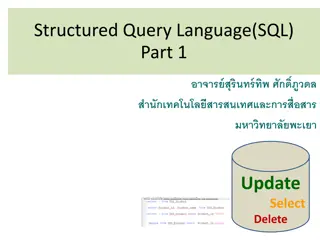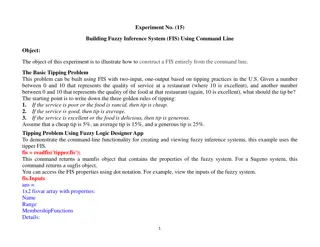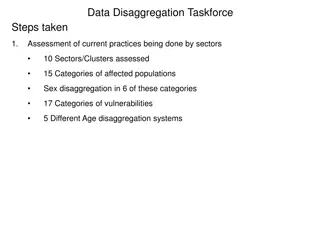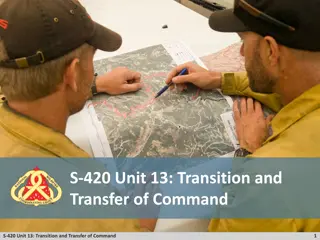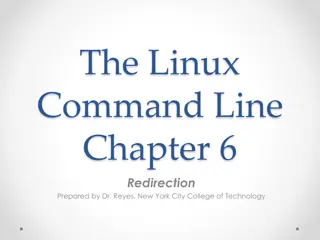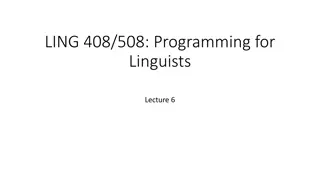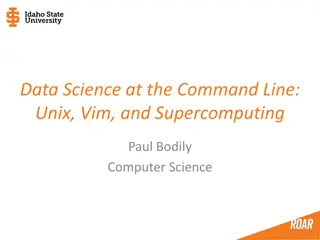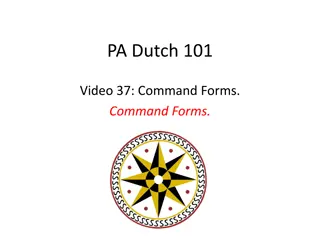The Great Commission: Universal Authority to Make Disciples for Salvation
Explore the universal authority and command to make disciples of all nations for eternal life, backed by Jesus in the Great Commission. Learn how to preach the Gospel, baptize, and lead others to Christ. Discover your role in fulfilling this command.
3 views • 21 slides
Building Enterprise Information Technology and Mission Systems
The document discusses the Building Enterprise Information Technology and Mission Systems program led by Lt. Col. Edward Ned Jones and focuses on the Space Systems Command's vision to deliver resilient and integrated systems for multi-domain warfighting. The content also delves into the Kill Chains
1 views • 6 slides
Introduction to Linux Command Line
The significance of the command line interface in computing, understand why it is preferred for efficient file management, and discover Linux as an alternative operating system widely utilized on servers and supercomputers. Learn how to access a Linux server via SSH for practical application.
1 views • 14 slides
Unit Objectives
Learn about the importance of chain of command, unity of command, and unified command in organizational leadership. Discover how these concepts help establish clear communication, streamline decision-making, and optimize resource management during incidents. Explore the advantages of using unified c
1 views • 35 slides
Comprehensive Overview of CERT Basic Training and Incident Command System (ICS)
Neighborhood organizations and individuals can benefit from CERT Basic Training, learning about Disaster Preparedness, Medical Operations, Fire Safety, and more. The Incident Command System (ICS) provides a systematic approach to emergency response, emphasizing scalability and common terminology. Th
0 views • 29 slides
Comprehensive Overview of Incident Command System for Schools
This presentation provides a detailed insight into the Incident Command System (ICS) for schools, outlining its purpose, structure, key concepts, and how individuals can fit into an ICS during emergencies. Topics covered include coordination with community partners, the importance of ICS, its struct
2 views • 16 slides
E3 Playbook: Discipleship Multiplication in Action
Explore the E3 Playbook, a strategic guide based on Matthew 28:18-20, designed to empower individuals in personal transformation and public multiplication as disciples of Jesus. Learn how to engage, equip, and empower through biblical principles and practical tools, fulfilling the clear command to m
0 views • 24 slides
United States Space Systems Command International Affairs Overview
The United States Space Systems Command's International Affairs division emphasizes partnership with countries worldwide to address the challenges of the current decade. The presentation highlights the growing threats in space, including developments by Russia and China, stressing the need for a res
0 views • 5 slides
Incident Management Fundamentals and Command Structure Review
Explore key NIMS doctrine concepts, agency policies, incident complexity factors, and Unified Command functions in managing complex incidents or events. Learn about Incident Action Planning, transfer of command, and the roles of Command and General Staff positions. Gain insights into incident comple
0 views • 11 slides
Understanding Transfer of Command Procedures in Incident Management
The Transfer of Command lesson delves into the process of shifting incident command responsibilities, outlining reasons for transfer, and discussing how a more qualified individual's arrival does not always necessitate a change in command. The lesson emphasizes the importance of face-to-face transfe
1 views • 11 slides
Basic Incident Command System Overview
This lesson provides a summary of the Basic Incident Command System for Initial Response course content. It covers the NIMS framework, ICS management systems, incident command structure, unity of command, communication protocols, delegation of authority, and management by objectives. Understanding t
5 views • 15 slides
Incident Command System Overview and Structure
Incident Command System (ICS) provides a standardized approach to incident management. It offers flexibility, adaptability, and efficient management for incidents of varying sizes and complexities. ICS consists of top-down structure with key functions like logistics, operations, planning, finance/ad
1 views • 22 slides
Nonpoint Source Categories: The Wagon Wheel Tool Training Agenda
Delve into the comprehensive training agenda for the Wagon Wheel Tool focusing on nonpoint source categories. Explore options for submitting data to EPA, templates for inputting data, and interactive demonstrations. Understand the staggered development plan of different source categories and learn a
0 views • 16 slides
Understanding Economic Systems and Their Impacts
Explore traditional, command, and market economies, and how they address economic questions. Understand the concept of mixed economies and their placement on a continuum between market and command systems. Compare economic systems in Israel, Saudi Arabia, and Turkey. Delve into essential economic vo
0 views • 17 slides
Understanding Alternative Investment Funds (AIFs) and Their Categories
Explore the world of Alternative Investment Funds (AIFs), including their introduction, categories, regulations, and taxation. Discover the benefits of AIFs, such as flexibility, diversification, and potential for higher returns. Learn about the entry of AIFs in the investment domain and the various
0 views • 30 slides
Introduction to Builders Law: Industry Context, Purpose, Administration, and Registration Categories
Over 600 companies in the Contractor Development Industry contribute significantly to the Cayman Islands' GDP. The Builders Law aims to protect consumers and businesses, enhance industry competency, and establish registration categories for different types of contractors. The Builders Board oversees
0 views • 15 slides
Effective Incident Command System for School Emergency Preparedness
This presentation introduces the Incident Command System (ICS) for schools, emphasizing the importance of coordination with community partners and outlining the purpose and structure of the ICS. It explains key concepts, the roles within the system, and the sections involved in incident response. Ke
0 views • 13 slides
Incident Command Structure and Span of Control Overview
Incident Command Structure helps in managing incidents effectively by utilizing ICS terminology and levels as needed. The flexibility within ICS allows for structuring incidents correctly based on individual needs. Understanding the Span of Control is crucial for supervisors to manage the number of
2 views • 24 slides
Understanding the Importance of Chain of Command in NDOC Training
Explore the concept of chain of command in NDOC Training, including authority, responsibility, and accountability. Learn about the position of authority, ranks within the organization, and the significance of maintaining a structured hierarchy for effective operations. Discover why a chain of comman
3 views • 27 slides
Understanding Methodological Choice and Key Categories Analysis in Greenhouse Gas Inventory Management
Methodological choice and key categories analysis play a crucial role in managing uncertainties in greenhouse gas inventories. By prioritizing key categories and applying rigorous methods where necessary, countries can improve the accuracy and reliability of their emissions estimates. Key categories
0 views • 24 slides
Naval Facilities Engineering Command Northwest Program Overview
The Naval Facilities Engineering Command (NAVFAC) Northwest is responsible for a wide array of installations in the Northwest region of the United States. From NAS Whidbey Island to Naval Station Everett, NAVFAC Northwest supports various commands and facilities critical to naval operations. The com
0 views • 15 slides
Ethical Theories: Divine Command vs. Virtue Theory Explained
Divine Command Theory asserts that morality is derived from God's commands, contrasting with Virtue Theory which focuses on developing moral virtues to achieve human flourishing and excellence. Divine Command Theory relies on religious texts, while Virtue Theory emphasizes the cultivation of virtues
0 views • 24 slides
Comprehensive Review of Drugs, Categories, and Drug Influence Evaluation
This mid-course review covers key aspects such as defining drugs, naming drug categories and subcategories, identifying drug categories for specific drugs, components of drug influence evaluation, and examinations conducted as part of the evaluation process. The content also includes identifying dru
0 views • 28 slides
Understanding Incident Command System (ICS) Organizational Components
This lesson introduces the key components of the Incident Command System (ICS), including the Command Staff, General Staff, and essential tools. It covers the roles of the Incident Commander, Deputy Incident Commander, and Command Staff positions, emphasizing their functions in managing incidents ef
0 views • 40 slides
Overview of Incident Command System (ICS) for Emergency Response
The Incident Command System (ICS) is a model designed for effective command, control, and coordination of emergency responses at various levels. It provides a structured framework for managing incidents, ensuring unified command, setting objectives, managing resources efficiently, and maintaining cl
0 views • 18 slides
Command Officer Training Overview - Feb. 15, 2020
Explore the essential elements of the Command Officer Training held on Feb. 15, 2020, in Stoughton, SK. The training covers topics such as Legion's mission statement, chain of command, leadership, dress code, conflict management, communication, and more. Learn about the responsibilities of district
0 views • 42 slides
Crime Statistics Report for Valley Area Command January-June 2023
The Albuquerque Police Department's monthly crime statistics for Valley Area Command from January to June 2023 have been reported. The data includes information on various crime categories such as weapon violations, drug/narcotics, stolen property, robbery, motor vehicle theft, larceny/theft, destru
0 views • 13 slides
Understanding Command-line Arguments and Errors
Learn how to utilize command-line arguments in Python scripts to enhance flexibility and parametrize functions for various inputs. Explore ways to access and utilize command-line arguments effectively, while handling errors gracefully.
0 views • 30 slides
Understanding Multiclass Logistic Regression in Data Science
Multiclass logistic regression extends standard logistic regression to predict outcomes with more than two categories. It includes ordinal logistic regression for hierarchical categories and multinomial logistic regression for non-ordered categories. By fitting separate models for each category, suc
0 views • 23 slides
Understanding Knowledge Representation and Categories in Information Systems
Exploring various types of representations and categories, this content delves into Aristotle's classical view of categories, the contrast between Aristotle's empirical approach and Plato's Ideals, the concept of prototypes, and different models for categorization. It highlights how entities are cla
0 views • 21 slides
Comprehensive Overview of SQL: Commands and Categories
Explore the world of Structured Query Language (SQL) through this detailed guide covering SQL categories, command classifications (DDL, DML, DCL, TCL), data manipulation and control languages, and transaction control language. Learn about creating, altering, and dropping database objects, data retri
0 views • 14 slides
Building Fuzzy Inference System (FIS) Using Command Line: Tipping Problem Example
Illustrate constructing a FIS from the command line to solve the Basic Tipping Problem. Define rules based on service and food quality to determine tip percentage. Demonstrates creating and viewing fuzzy inference systems using a command-line approach.
0 views • 7 slides
Data Disaggregation Taskforce: Assessment and Recommendations on Vulnerabilities
The Data Disaggregation Taskforce is conducting an assessment of current practices across sectors, assessing 10 sectors/clusters, 15 categories of affected populations, and identifying vulnerabilities in 17 categories. The Taskforce is working on harmonizing categories and finalizing recommendations
0 views • 6 slides
Evolution of Welfare Impact Categories in Animal Research Guidelines
Canadian Council on Animal Care (CCAC) published updated guidelines titled "Categories of Welfare Impact" in 2024, replacing the Categories of Invasiveness. The new guidelines focus on animal experiences, procedures carried out on animals, and positive impacts on animal welfare. The categories (A-E)
0 views • 21 slides
Transition and Transfer of Incident Command
Ensuring effective transition and transfer of incident command is crucial for incident management. This involves activities such as demobilization planning, transfer of command planning, incident package creation, and more. Detailed plans need to be in place to facilitate a smooth handover of author
0 views • 12 slides
Comprehensive Guide to Redirection, Pipelines, and Patterns in Linux Command Line
This comprehensive guide covers the use of redirection, pipelines, filters, and patterns in the Linux command line. Learn how to redirect output, use pipelines to pass output between commands, apply filters like sort and uniq, search for patterns using grep, and more. Gain a deeper understanding of
0 views • 7 slides
Introduction to Shell Arithmetic and Command.bc for Linguists
Today's lecture covers shell arithmetic, positional parameters for shell scripts, making shell scripts executable, and using command.bc for mathematical computations in the shell environment. Examples and demonstrations on shell arithmetic, utilizing the 'expr' command, and leveraging 'bc' command f
0 views • 21 slides
Exploring Data Science at the Command Line with UNIX and Vim
Delve into the world of data science through the command line, UNIX, and Vim, which offer agile, filesystem-integrated, scalable, and extensible solutions. Discover the significance of the command line, its integration with other technologies, and the role it plays in supercomputing and remote compu
0 views • 29 slides
Understanding Syntax and Lexical Categories in English Grammar
Syntax is the study of rules in generating grammatical sentences, focusing on building grammars that produce well-formed English sentences. It involves organizing words into categories like nouns, verbs, adjectives, and adverbs to form phrases and clauses. Lexical categories are determined based on
0 views • 33 slides
PA Dutch 101 - Command Forms
PA Dutch 101 Video 37 covers Command Forms in Pennsylvania Dutch. There are three command forms: Singular, Plural, and Lets. The choice of form depends on the number of people being addressed. The Singular Form is used for one person, the Plural Form for multiple people, and the Lets Form when sugge
0 views • 8 slides

